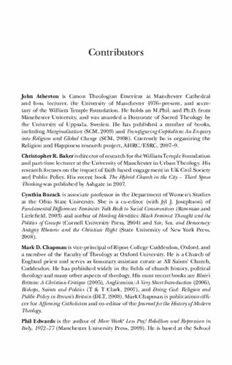
Remoralizing Britain?: Political, Ethical and Theological Perspectives on New Labour PDF
266 Pages·2009·2.624 MB·English
Most books are stored in the elastic cloud where traffic is expensive. For this reason, we have a limit on daily download.
Preview Remoralizing Britain?: Political, Ethical and Theological Perspectives on New Labour
Description:
On seeking office and in coming to power, New Labour presented its vision for Britain in moral terms. During the course of the New Labour administration, further moral themes have been introduced: responsibility and respect, the merits of local government and self-governance, and the moral imperative to confront threats of ‘terror’ from abroad. This moral agenda, with its apparently religious roots, has been much noted, but not much discussed. The political phenomenon of New Labour requires the disciplines of theology and ethics, as well as social theory and politics, to be properly understood and assessed. Drawing together for the first time theorists from a range of disciplines and commitments, this interdisciplinary collection offers a reckoning of this New Labour decade. As such, it has four central research questions: What is the nature of this remoralising? What are its sources? How effective has it been and what difference has this moral discourse made? What can be learned from Blairism about the relationship between faith, morals and governance?
See more
The list of books you might like
Most books are stored in the elastic cloud where traffic is expensive. For this reason, we have a limit on daily download.
